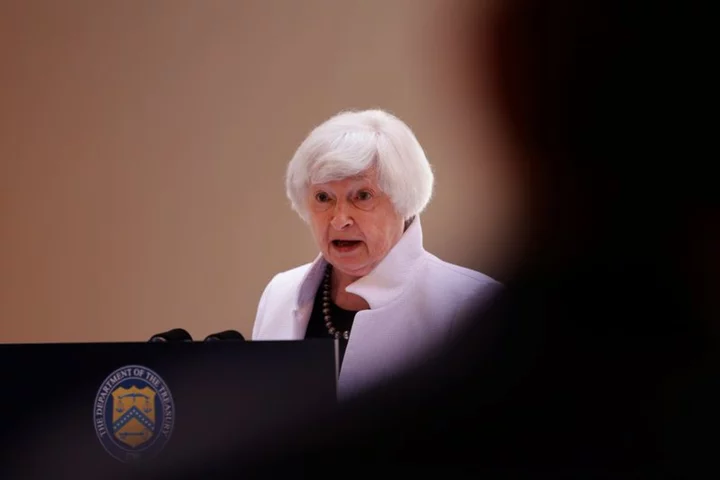By Andrea Shalal and David Lawder
MARRAKECH, Morocco U.S. Treasury Secretary Janet Yellen said the unprecedented attacks on Israel by Palestinian Islamist group Hamas posed additional risks to an already tepid global economic outlook, but the United States still appeared headed for a soft landing.
Yellen joined other top financial leaders in condemning Saturday's massive incursion into Israel from Gaza launched by Hamas and pledged Washington's strong support for Israel "in any way that's necessary."
Israel's declaration of war on Hamas and its pounding of Gaza following Saturday's devastating attack hung over the annual meetings of the International Monetary Fund and World Bank in Marrakech, Morocco, although the world's top financial experts said it was too soon to draw clear conclusions.
The sudden outbreak of war in the Middle East added a further risk factor to a global economy already strained by increasing economic fragmentation into two blocs led by the United States on one hand, and China and Russia on the other.
"The world has become more shock-prone, with increased risks to growth, development, jobs, and living standards that widen inequalities within and across countries," the IMF and World Bank, joined by Morocco's finance minister and central bank governor, said in a "Marrakech Proclamation" on Wednesday.
"We need to stand together, united in the goal of protecting our future prosperity and ending extreme poverty."
INFLATIONARY IMPACT
IMF first deputy managing director Gita Gopinath said the war could hit the economy if it expanded. "If it turns into a wider conflict and that causes oil prices to go up, that does have an effect on the economies," she told Bloomberg Television, adding that a 10% increase in oil prices could depress global output 0.15 percentage point the following year.
In its latest World Economic Outlook, released on Tuesday, the IMF left its forecast for global real GDP growth in 2023 unchanged at 3.0% but cut its 2024 forecast to 2.9% from its July forecast of 3.0%. World output grew 3.5% in 2022.
Yellen told a news conference that funding for Ukraine and "resources" for Israel were an "absolute top priority" for the Biden administration, a message also aimed at assuaging concerns that the Gaza war would siphon off resources urgently needed by Kyiv to advance its fight against Russia's invasion.
In Washington, the White House described active discussions with Congress about additional funding for Israel and Ukraine.
Crude oil prices jumped and safe-haven currencies like the yen rose as Israeli warplanes bombed Gaza neighborhoods ahead of a potential ground offensive and a U.S. aircraft carrier strike group arrived in the eastern Mediterranean Sea.
Yellen acknowledged the potential impact of exogenous shocks on the global economy, including Russia's invasion of Ukraine in February 2022, but downplayed the potential for the Gaza war to batter the global economy.
"Thus far, I don't think we've seen anything suggesting it would be very significant," she said, adding that she continued to expect a soft landing for the U.S. economy.
"Of course the situation in Israel causes additional concerns. I'm not saying soft landing is an absolutely sure thing. But I continue to think it's the most likely path," due to the resilience in the labour market and moderating wage pressure, Yellen told a briefing.
World Bank President Ajay Banga told a separate news conference the conflict would complicate the global economy's path: "I believe that wars are completely, extremely challenging for central banks who are trying to find their way through a very difficult situation, to a relatively soft landing."
SANCTIONS OPTION
Yellen said she had nothing to announce on whether the United States would impose new sanctions on Iran if evidence emerged that the country was involved in the attack, and said Washington also had sanctions in place on Hamas and Hezbollah.
"This is something that we have been constantly looking at, and using information that becomes available to tighten sanctions," she said. "We will continue to do that."
Asked whether Washington could reverse its decision to unfreeze $6 billion in Iranian funds as part of a U.S.-Iran prisoner swap in September, Yellen said those funds had not yet been touched, and Washington was keeping its options open.
"These are funds that are sitting in Qatar that were made available purely for humanitarian purposes, funds that have not been touched. I wouldn't take anything off the table in terms of future possible actions."
U.S. Secretary of State Antony Blinken has said he had "not yet seen evidence that Iran directed or was behind this particular attack, but there’s certainly a long relationship."
(Reporting by Andrea Shalal; Editing by Chizu Nomiyama)

